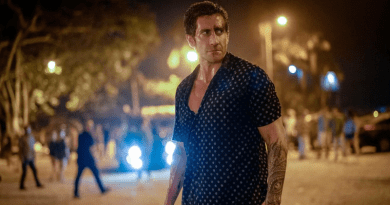The Return (2024) Review: Ralph Fiennes and Juliette Binoche’s Reunion isn’t Enough to Compensate For This Visually Sumptuous But Languid Historical Drama
The Return reminds me of the 2004 era when historical epics Troy and King Arthur were stripped of their mythical and fantastical elements in favour of gritty takes. The same case happens to Uberto Pasolini’s grounded approach to Homer’s Greek epic poem The Odyssey with none of the gods and monsters and magic. The movie even skips the treacherous sea adventure as the story — credited to John Collee, Edward Bond and Uberto Pasolini — dives straight to the aftermath of Odysseus’s (Ralph Fiennes) 10-year journey home to the island of Ithaca after the Trojan War.
When we first met him, he’s already washed ashore on the beach at Ithaca, naked and badly injured. The island that he ruled as a king before departed for the Trojan War with his warriors twenty years ago is no longer the same. He is long presumed dead, leaving his wife Queen Penelope (Juliette Binoche) and their young son Telemachus (Charlie Plummer) defenceless. What’s even worse is that Penelope is forced to choose a new husband among one of the many persistent suitors, particularly Antinous (Marwan Kenzari). But she remains hesitant, delaying as long as she can and claiming she promises to pick one once she completes weaving her shroud.
Meanwhile, local pig farmer Eumaeus (Claudio Santamaria) saves Odysseus and cleans him up. Odysseus soon finds out what happens to his wife and son, disguising himself as a beggar dressed in ragged clothes upon entering the palace with the help of Eumaeus. The Return marks the long-awaited reunion of Fiennes and Binoche, where they were last seen acting together in The English Patient back in 1996 and before that, Wuthering Heights in 1992.
As expected, the two deliver top-notch performances, beginning with Fiennes’ subtly understated performance as Odysseus, a broken and battered man coming home from war. We see how he is being humiliated as a beggar while coping with PTSD. Not to mention the internal rage that he has been bottling up even after he learns about the current dire situation in his home island of Ithaca, particularly the suitors forcing his wife Penelope to make a decision. Fiennes also looks amazingly ripped as he shows off his impressive physique for a sixty-something actor.
Then, there’s Binoche, whose predominantly minimalist acting speaks volumes with her expressive gazes and stares as Queen Penelope. The story also delves into Odysseus’s revenge, where blood eventually sheds when push comes to shove once he finally has enough and unleashes his anger.
But to get there, one has to sit through a languid slow burn of a movie like watching the flame flickering and burning the firewood at night. This is especially true with the first half of the movie which meanders a lot to the point it feels pretentious. I’m fine with a movie embracing the slow-burn approach but too much pondering without a sense of forward momentum isn’t doing The Return a huge favour.
While Fiennes and Binoche did their best to elevate the lacklustre material, the same cannot be said for the rest of the cast. This includes Charlie Plummer, whose disappointingly thankless performance as Telemachus is reduced to a mere whiny young man. Even when his character reunites with Odysseus at one point, Pasolini botches the opportunity to develop the long-lost paternal bonding of father-son rapport between Odysseus and Telemachus. Marwan Kenzari who plays the scheming antagonist Antinous, one of the suitors who wants Penelope to marry him isn’t as formidable as I’m expecting in the first place.
On the technical front, The Return looks visually stunning, thanks to Marius Panduru’s atmospheric cinematography and Giuliano Pannuti’s minimalist production design. Given the well-known Homer’s story in the history of literature and the stellar on-screen pairing of Ralph Fiennes and Juliette Binoche, it’s a pity that Pasolini’s stripped-down version of The Odyssey in The Return misses the mark.





